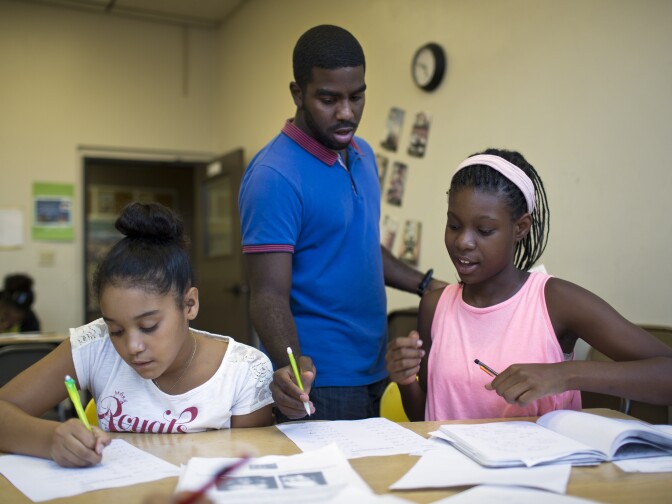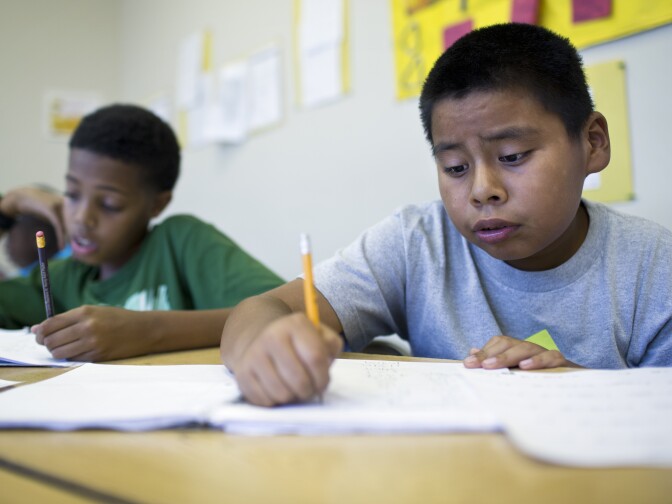This story is free to read because readers choose to support LAist. If you find value in independent local reporting, make a donation to power our newsroom today.
This archival content was originally written for and published on KPCC.org. Keep in mind that links and images may no longer work — and references may be outdated.
Working with churches, summer algebra program for black students aims to boost college entry
Dozens of African American teenagers this week finished a six-week algebra program at the West Angeles Church of God in Christ Youth Center in Los Angeles' Crenshaw neighborhood.
The program is part of the Summer Algebra Institute, one of 18 math academies statewide funded by the California State University in an uncommon partnership with 18 African American churches this summer. In sites located from Sacramento to Whittier, each enrolled around 550 students.
The institute's aim is to close a wide academic achievement gap between African American students and those in other ethnic groups in California.
Educators reached out to the students' families through the churches. With their connections in the community, church leaders helped the program find qualified students.
Increasing math competency is a critical part of the countrywide efforts to raise achievement for low-performing students since doing poorly in high school math doesn’t just shut the doors to an engineering career; for many students, it shuts the doors to college itself.
“This was a way to get students academically prepared so that they could complete the math sequence in four years in high school. That way, they’re guaranteed access to college,” said Jacqueline Mimms, a founder of the algebra program and the head of enrollment at California State University, Bakersfield.
There are many reasons students don’t do well in math. But educators believe the transition between elementary school and middle school is key to whether a student succeeds academically.
“In sixth grade, I don’t think I did as well because it was my first year getting used to all of the classes, switching all the classes, going from one class, to the next, to the next, to the next,” said 12-year-old Alyse Wilson-Gittens.
Alyse got stuck on adding and subtracting fractions with different denominators. She said it didn’t help that school felt like a factory assembly line.
“Every five seconds, it’s your teacher yelling at you, and, 'Oh, well, you did it wrong.' Well, you never taught me right,” she said.
According to the California Department of Education, 72 percent of African Americans passed the math portion of the state’s high school exit exam last year. The number may seem high, but it’s the lowest pass rate among student ethnic groups.
This disparity worries educators. Only two years of math is required for a high school diploma, but admission to a university requires at least three years of the subject.
The program runs for six weeks, four days a week, and five hours a day. The focus is on preparing students to do well in algebra in the eighth or ninth grade so that they can take and pass math classes in each year of high school.
Institute teacher Tammara Lewis said in order to build pre-algebra skills, she reviews basic concepts with the students during the summer course.
“They’re learning orders of operations, exponents, fractions, algebraic expressions,” Lewis said. “They’ve learned the lattice method (an alternative to long multiplication). They’ve learned Egyptian numerals.”
That reference to a country in north Africa is important; it’s part of the program’s effort to connect these students to their culture. Teachers tell the students that without their ancestors, there would be no math as we know it.
The class is not all about being serious about math; Lewis makes sure the students have fun by playing numbers games. One day, students competed to get six or seven-digit numbers in the correct order, filling the class with whooping and clapping as the teams nailed their answers.
The program wraps up this month, so teachers have been talking to students about how they can take what they learned and do better when they return to schools, even those that may not meet the students’ needs.
“One of the topics I talk about in my workshop on critical thinking and study skills...is how to manage your teacher,” said program organizer Cherylnn Pope. She teaches the students that “there’s a respectful way to approach and talk to adults.”
Pope and others who run the algebra institute hope in the future to expand the program by giving the summer school students additional help throughout the school year.
For Alyse Wilson-Gittens, the boot camp was about laying the groundwork for what she wants to be when she grows up: a doctor.
She said a conversation with her mother convinced her to give up part of her summer to enroll in the algebra class.
“I’m like, why is math important to doctoring? Isn’t it just science and putting band-aids on things? And my mom’s like, 'No, math is very important in doctoring.'”
Alyse finished the Summer Algebra Institute this week and starts seventh grade in two weeks.














